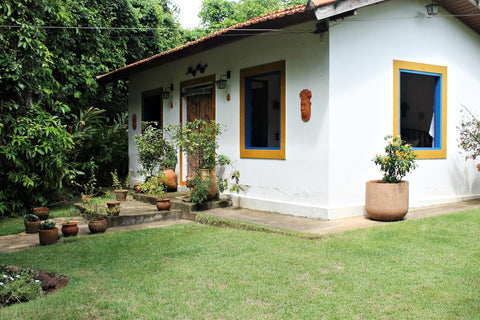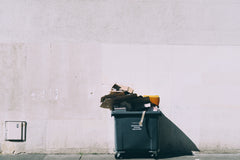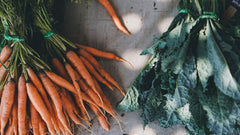5 Easy Ways To Live Sustainably

After decades of thoughtless consumption, we have reached a point of necessary change. There are a plethora of online articles, forums, podcasts, and books to guide our habits to a cleaner, greener Earth, but, in the age of information overload, it's difficult to focus on which changes make the most difference. In this article, we will furnish you with 5 simple ways to accomplish change in you and your families daily lives without feeling like an eco-terrorist in the making.

Bring Your Own
Everyone is bringing their own grocery bags and reusable water bottles these days, right? So what else can you carry that will help reduce unnecessary waste?
- Pack your own utensils to prevent single-use plastic.
- Carry reusable mesh bags to avoid the flimsy plastic for your produce.
- Bring a cup for beverages to reduce disposable cups.
There have been countless times I make it through an order at a restaurant refusing all the unnecessary disposable items like the straws, plastic cutlery, and then, I am served my water in a plastic cup. Even when all the other beverages are served in a glass. I now have a collapsible stainless steel cup that attaches to my keychain.

Recycle
Yeah, Yeah, you heard it before. Me too! I recently read the most insightful book that made me realize my obsessive environmental habit of recycling everything was creating a bigger problem. The book is entitled Junkyard Planet by Adam Minter. He grew up in the junkyard business, so he knows the value of waste. He travels the globe and reports on how waste materials are reused. All told, there are 3 waste products that are both coveted and easy to recycle.
- Metals are toxic to extract and many countries do not have the resources to open pit mine, making metals a highly coveted and profitable business.
- Glass is easy to reuse by crushing, reheating then molding into new products. Otherwise, sand from our rivers, lakes, and stream beds is harvested for new glass products.
- Paper Products are the easiest bins to find for recycling. Paper can be recycled into many different products including shipping & packaging materials, making it a better option than cutting down our forests for cardboard.
*Did you know when the United States was a fledgling nation, newspaper companies imported rag waste from Europe for the printing of publications? That is why we often refer to a magazine or newspaper as the local rag.

Buy Local & Buy Organic
You may have heard this before and it bears repeating, local products use fewer resources and chemicals than foods from far away. The fossil fuels used for transport and the chemical sprays required to enter the country make locally grown organic fruits, vegetables, cheeses, and meats a much better choice for your family's health and the environment.

Meatless Monday
Eating meatless one day a week began 100 years ago during World War I to assist in food rationing for soldiers. The challenge was reintroduced during World War II and declared by President Roosevelt, Meatless Monday. The idea was for citizens to come together for a greater cause. In 2003, Meatless Monday was brought back to the American public for health concerns of eating too much meat. In the nearly 2 decades of the Meatless Monday campaign, there are over 40 countries and countless people observing the dietary measure for personal health and the overall welfare of the planet.
Animal agriculture requires vast amounts of land, water, and food, not to mention the untreated excrement waste associated with the process. Meatless Monday does not require you to become vegan, but, much like war rationing, asks citizens to reduce meat consumption 1 day a week for the greater good of our planet. We have instituted the practice in our household and it has become a tradition we look forward to as we all find new delicious meatless recipes. Give it try, you might just enjoy it!

Shop Consciously
Everyone thinks about what they need from the store. We make lists or price compare online, but do we think of the life cycle of a product.
To live sustainably, we must think about the effects of our choices on the environment and how to simplify our needs to benefit nature, wildlife, and the quality of life for future generations. Here are 5 questions to help us become conscious consumers.
- Do I really need this product?
- Will I use it more than once?
- Can I buy it used or borrow from someone?
- Is this product nontoxic & made from sustainable resources?
- If not, is there an eco-friendly alternative?

1 comment
The transition from one world to another is now clear. Well done!